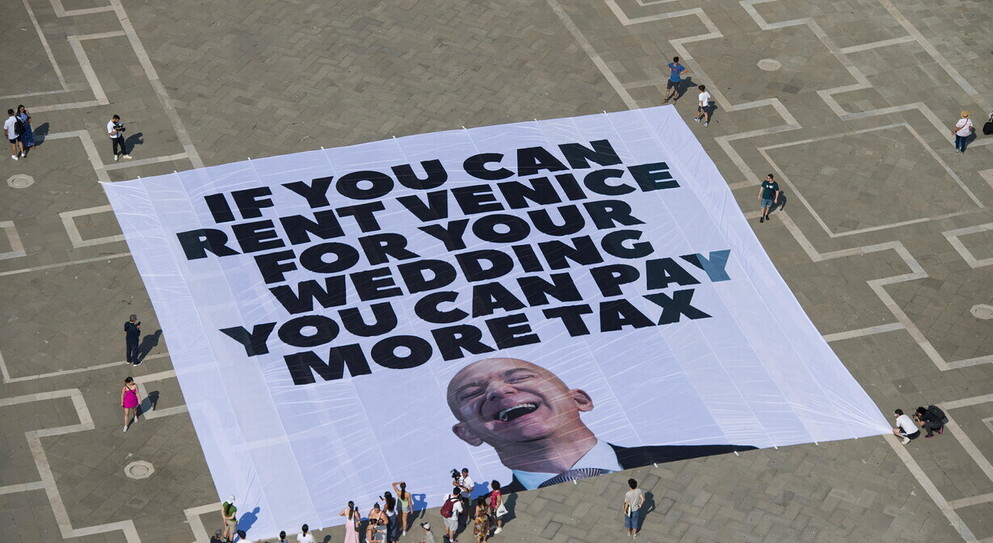The hatred for mister Amazon and for his venetian wedding with Lauren Sánchez has a its history rooted in time. It is an ancient hatred, a hatred of the left, that demonizes capitalism and removes from our view the truth: that where there is freedom there are successful entrepreneurs
They demonstrate holding tight the smartphone between their hands. They write indignant posts on American servers. They organize antifa own meetings through Californian apps. They fight against the dictatorship of the digital oligarchs using the platforms of which the company led by the man they contest offers them the cloud to save their own data. The Venetian wedding between Jeff Bezos and Lauren Sánchez – many congratulations – has offered infinite cues of reflection for reasoning on the new and suggestive frontiers of the antifascism antipauperist, that has chosen to transform, with the little golden stamp of the National Association of Partisans, the nuptials of the number one of Amazon into the symbol of all that the conformist little drawing-room of antic-capitalist respectability should fight in the world. One could suggest, to the new partisans of freedom worried more about the finances of Bezos than about the militias of Putin, that the presence of a Bezos in Italy, and in Venice, should be treated like a manna from heaven, not like a storm to dodge. A datum. The only public space rented by Bezos in Venice – Bezos who meanwhile has signed a check of 3 million to projects of environmental protection and local restorations, asking the guests to transform the wedding gifts into offerings to bodies like UNESCO-Venice, Corila and Save Venice – is the Arsenal. The Arsenal records revenues equal to 1.2 million a year for private events. Bezos, alone, will spend 200 thousand just for the rent of the Arsenal, and will spend one million to organize the party, giving work to about one hundred craftsmen.

Who are the enemies of the workers? The hatred for Amazon, in truth, and for its boss, hatred carried on often with the same technological tools produced by the oligarchs contested by the new international of the indignados, is not new, is not a novelty, but has its history rooted in time. A history of the left, and you will remember when years ago the socialist mayor of Paris, Anne Hidalgo, proposed to boycott Amazon at Christmas, proposal then promptly picked up by Salvini. A history of populistic hatred of the right, and you will remember how many battles Trump, in his first round at the White House, fought against Bezos, portraying the head of Amazon, before the opportunistic embrace built in the new Trumpian season at the White House, as the perfect incarnation of the liberal-technocratic elite to despise and humiliate. The story is always the same. It is said that Amazon destroys the artisans and one forgets to remind that instead often Amazon the artisans saves giving them more opportunities to compete in the world. It is said that Amazon pays few taxes but one forgets to remind that if the problem is that the revenue produced by the Big Tech does not stay all in the countries where the consumptions happen the solution is not to tax a single company but to reform the international fiscal system. It is said that Amazon has created a monopoly led by an oligarch who wants to buy the world but whoever criticizes Bezos for the money that he has piled up, as if it were a crime to be rich, forgets to remind the millions of jobs created by Amazon, forgets to remind how Amazon has made goods and services accessible to everyone. One can go around it as much as one wants, even in this weekend of Venetian parties, but the point is always the same. The hatred for Bezos is a hatred that concerns a worm present in our democracies. And it is a hatred that, demonizing capitalism, removes from our view a truth: where there is freedom, successful entrepreneurs exist, who can even arrive to create monopolies; where there is no freedom the only monopolies possible are those of the state, but mysteriously the international of the antifa, having to choose between the fight against the symbols of freedom and the fight against the enemies of freedom, manage always to sit on the wrong side: but only through roguishness, not because all the other seats were occupied.
This article is translated by artificial intelligence. If you want to report errors you can write to [email protected]

